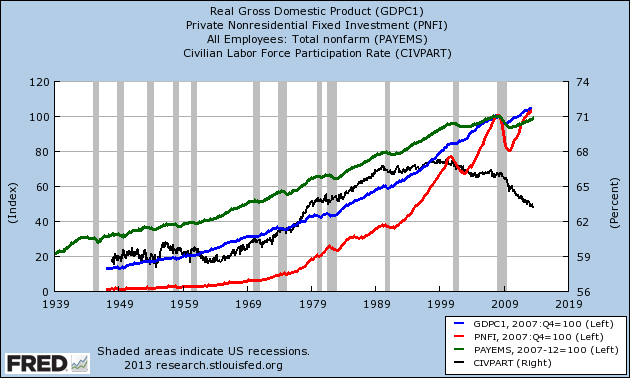
by Gary Mintchell | Nov 12, 2014 | Commentary, Leadership, News
Bringing data, history and common sense to political and economics arguments is usually fruitless. But this unabashed capitalist tries to bring data to the discussion. From the TED Talks paragraph, “Nick Hanauer is a rich guy, an unrepentant capitalist — and he has something to say to his fellow plutocrats: Wake up! Growing inequality is about to push our societies into conditions resembling pre-revolutionary France. Hear his argument about why a dramatic increase in minimum wage could grow the middle class, deliver economic prosperity … and prevent a revolution.”

by Gary Mintchell | Sep 10, 2013 | Commentary, News
 Andrew McAfee’s latest blog post takes another dive into economy statistics. He calls it “No News” which is both good news and bad news.
Andrew McAfee’s latest blog post takes another dive into economy statistics. He calls it “No News” which is both good news and bad news.
It’s the same story. The overall economy is growing modestly. Profits are climbing—even in manufacturing. But employment continues to lag. In fact as shown in the graph accompanying this article, not only is employment not growing at the same pace as the economy, people seem to be leaving the workforce.
McAfee asks why? What is going on?
I posit a number of things that I have not seen any analysts address.
First, we only make things when people want things. Or at least when marketing convinces people that they want or need something. Some markets seem to be saturated. PCs have probably hit saturation. Autos hit the wall, maybe expanded a little, but with cars lasting longer than they used to, we just don’t need as many new cars—at least in America.
So, perhaps demand for manufactured goods is one thing. Perhaps the products in demand are not as expensive to manufacture as automobiles—the driver of economic prosperity for many years.
Second, we have had a history of atrocious management in manufacturing companies. Consider these points:
- Hiring people to mask problems, only to lay off the people when the problem is uncovered
- Sending jobs to places chasing cheap labor only to discover that logistics, quality, inventory costs, loss of intellectual property, and more were the unhappy result
- Failing to develop and produce quality products that people want—opening the door to international competition that creates jobs elsewhere. At least for a while.
Third, perhaps there is an underground economy.
- Maybe many have re-discovered the one-income household such as we had prior to the 1980s
- Maybe we have an “e-economy”—eBay, eTrade—people making money in nontraditional jobs, perhaps even out of the radar reach of the IRS
Back to manufacturing employment. It is just economic good sense to have the right number of workers. Even when holding to the basic principle of Lean—respect for people—it is bad management to cover problems simply by adding workers. The inefficiencies will eventually be discovered by competitors.
Job growth comes from growth in manufacturing itself. That means product-oriented companies—rather than finance-driven companies—that continue to innovate with new products and new methods of manufacture that in turn create new jobs.
That this does not happen is a function of senior management with short-sighted vision who have created cultures of fear and uncertainty rather than creativity and fun.







